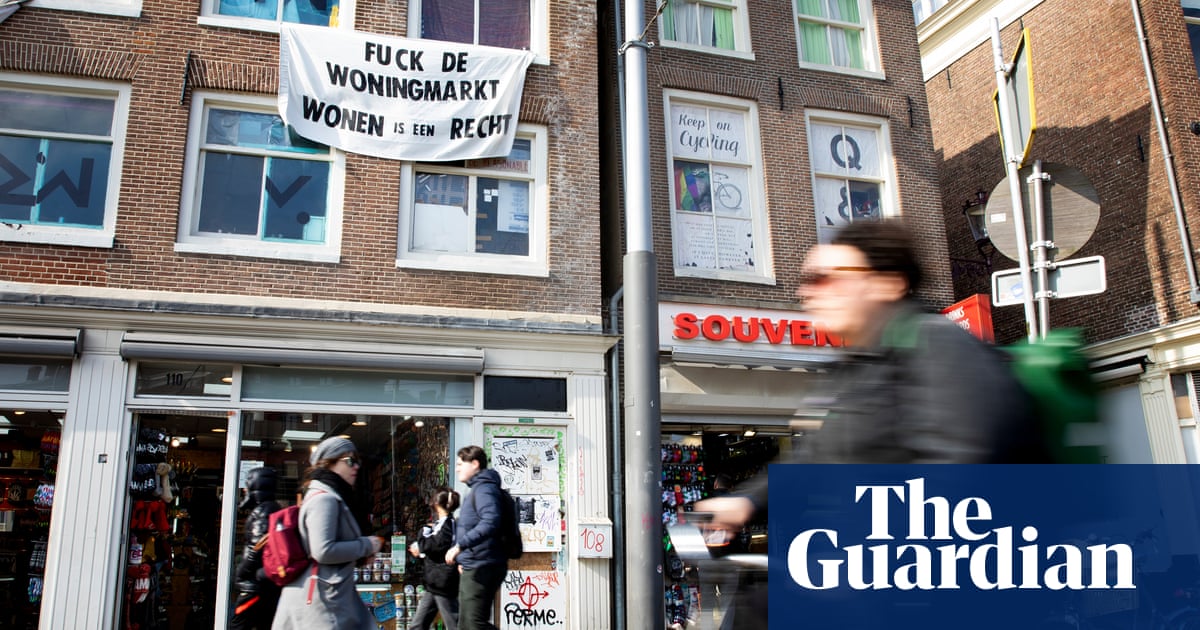Amsterdammers find themselves at the nadir of a Europe-wide housing shortage. But some bold initiatives offer hope
…
In a pan-European housing crisis, the Netherlands’ is next level. According to independent analysis, the average Dutch home now costs €452,000 – more than 10 times the modal, or most common, Dutch salary of €44,000.
That means you need a salary of more than twice that to buy one. Nationwide, house prices have doubled in the past decade; in more sought-after neighbourhoods they have surged 130%. A new-build home costs 16 times an average salary.
The rental market is equally dysfunctional. Rents in the private sector – about 15% of the country’s total housing stock – have soared. A single room in a shared house in Amsterdam is €950 a month; a one-bed flat €1,500 or more; a three-bedder €3,500.
The commercialization of housing has failed.
But hey let’s keep going full speed ahead with the policy because we can’t possibly afford to let rich people’s assets lose value
I live here in the more sought after cities and let me tell you, its fucking horrible. I have an adequate home because I got lucky, but even social housing/rent controlled housing is insane. My ‘waittime’ is 11 years and I won’t even be the first in line for 98% of the houses, those folk have like 16 years. I make below the median income, but with my partner combined, who also makes slightly below median, we are excluded to move into rent controlled housing. Because we make too much money. But not enough to buy a house locally… Nature is Amazing
A colleague of mine is moving 150km, away from all their fam, because that’s the only place that sold viable houses in their price range, another literally moved into a bus just so they can control where they live. Not great.
If this is nature then capitalists are a parasitic species that should be exterminated (in Roblox).
Ever since I visited, I’ve wanted to live in the Netherlands. I hope the situation eases so I can follow my dream without being seen as an asshole immigrant taking up space ☹️
Lol, time to find a different spot then. You’ll be thought of that for your whole life there.
We definitely have a housing crisis, but taking Amsterdam as an example is not representative for the entire country. That city is way more expensive than all other cities here and has jokes about it for ages, not just due to the current crisis.
I just don’t get this though. Shouldn’t high density housing be the most efficient? Why is it not constructed till its at just about the cost of construction. It should be the least profitable real estate given the low land use.
If they construct more houses then the prices go down.
And they want the prices to go up.
It is the most efficient but I guess since demand is so high landlords can increase rents a lot, even if space is used super neat. At least in my country there is still a huge drain into the cities and renting/buying in the countryside is way more affordable. My second guess is that it’s not that easy to build new housing, even if more efficient, in already dense cities. Nobody wants to tear older houses down (expensive) if it still works and you can make a good living on renting them. Maybe some incentive on building newer housing could be a start.
Just because it is efficient doesn’t mean it is enough.
Yeah, I’ve seen a Rotterdam penthouse for rent, same price as an Amsterdam basement flat.
Last I heard Utrecht is more expensive than Amsterdam these days
If Amsterdam was in the U.S., a bunch of people would be coming in here telling the people who live there to just move and buy or rent a cheaper home somewhere else. Is that going to happen with this thread? We shall see.
Amsterdam is quite interesting with regard to homeownership at least, there are a bunch of rich old folks trying to push out the red light district from what I’ve heard.
Also, with Amsterdam it’s not even an issue of buying houses, that’s just unimaginable for most people, it’s paying rent that’s getting worse. I’ve also seen people with high pay being able to afford a place, but just not being able to rent since none are available.
And all this is with rent controls.
I’m sure there are plenty of unique factors. I was just making a snide remark about people who think that “just move” is an answer to every housing crisis, something I see far too often on Lemmy.
For the record, I was looking for places to buy in Rotterdam the other month, and what I found was that by and large, if you want to buy things inside the city limits, it’s either some weird mansion in the bougie foresty part, a 3 million EUR apartment where your garage is in the apartment, and you enter your place by car lift, or an entire fucking apartment block. People just don’t sell cheap apartments piecemeal.
The upside is that living in “the suburbs” which means moderately dense villages and towns near the big cities is doable, and you might be able to commute even without a car since public transport is mostly good.
I’m sure there are plenty of unique factors
Correct. it’s a very complex situation, which nobody wanted, yet here we are. And politically and judicial, both on regional, national and European level, there is no known simple solution.
What really triggered this mess was a court ruling regarding an environmental N0 ( nitro oxygen?) and a Co2 and smallparticle emission report not very long ago. That ruling gridlocked everything.
Fully agree it’s a common refrain. And one I never understood. Even with my job where I can and do work fully remote, most of the places they always recommend have such terrible infrastructure I wouldn’t be able to do my job, DSL wouldn’t cut it.
Nobody is saying that in the US with the interest rates as high as they are…?
People are talking more about being stuck, locked in, and unable to move.
People keep saying it in threads regarding the U.S. housing crisis. “I got a house because I moved to Buttfuck, Montana and if you were only willing to quit your job and also move to Buttfuck, Montana and also learn to code and get a work from home job, you can buy a house too.”
This is the level interest rates were 30 years ago and no one had issues buying houses then. Rates aren’t the issues, people aren’t getting oaid enough and have to compete with corporations for their basic necessities at this point
Houses were cheaper then and wages were more in line with home costs?
Not sure the point you’re trying to make. Rates are the issue in the face of the price.
One needs to fall. Price won’t. Interest is the problem. They are all functions of one another.
Why can’t taller apartment buildings be built in the city to fulfill the housing shortage?
its built on sediment, the bedrock is too deep to use economically.
Amsterdam is at the wettest end of a giant floodplane, so going up is hard. That said, moderately tall building ARE being made on newly made land…
Most European cities try to keep their historic cores intact, with Amsterdam being no exception. Amsterdam has nodes around the city that can facilitate denser construction, but those nodes are probably not enough and don’t give residents the historic character of living in the center city.
Shhh, the NIMBYs might hear you
This is the best summary I could come up with:
Competition among those who can afford such sums – such as multinational expats – is so fierce that many pay a monthly fee to an online service that trawls property websites, sending text alerts seconds after suitable ads appear.
In a peaceful neighbourhood 30 minutes’ walk from Amsterdam central station, Lukas and Misty are among 96 tenants – half of them young refugees with residence permits – of a so-called Startblok, one of five around the capital.
But the Startblokken – like the multiple temporary accommodation programmes for “economically homeless” people in Amsterdam run by Kuschel’s De Regenboog – are drops in the ocean of the vastness of the Netherlands’ housing crisis.
In the rental market, the crippling lack of homes and large numbers of tenants who – for want of an affordable alternative – remain in social housing despite earning more than the maximum allowed have contributed to sky-high private rents.
Politicians including Geert Wilders, whose far-right Freedom party (PVV) finished a shock first in November’s general election, have blamed asylum seekers, foreign students and environmental laws.
Among multiple other factors, the rapporteur blamed a lack of regulation of social housing providers, an absence of rent caps in the private sector and “insufficient attention to the role of speculation and large investors in the real estate market”.
The original article contains 1,683 words, the summary contains 218 words. Saved 87%. I’m a bot and I’m open source!
And to add another viewpoint, this development has spiked the attitude and emotions concerning immigrations. For literally, atm there simply is no affordable housing to be found for the current nationals . Not talking about the political or the morality, simply about the absence of (current and new) infrastructure for placements in the foreseeable future.
Not to mention, that the Netherlands is one of the highest populated areas per km² in the world, especially considering that only like 30% of it’s total landsurface is used for housing and all the rest is industry, trade, but especially agriculture takes a huge bulk.










